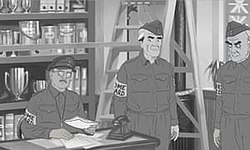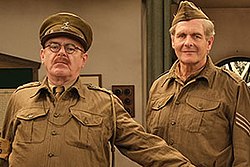Restoration and recreation
Colour restoration
By the 1990s, "Room at the Bottom", the sixth episode of Series 3, was the only episode produced in colour that did not have a colour copy in the archive; instead, it survived only as a 16 mm black-and-white film recording. Because of the way in which the original black and white recordings were made, colour information was sometimes inadvertently preserved in them even though it could not be displayed; this colour information is known as chroma dots. In 2008, a computer technique of colour recovery was developed to recover the chroma dot information from black and white recordings to recreate a usable colour signal. "Room at the Bottom" was used as the pilot project to test this process of colour recovery, with the success of the episode's restoration leading to it being used on other 16mm recordings. [9] The new colour copy was officially adopted as the BBC's archive copy, [10] and "Room at the Bottom" was broadcast in colour for the first time in almost forty years on 13 December 2008. [11]
Recreations
Restagings
Although not a deliberate attempt to restore lost material, the "Cornish Floral Dance" was also performed at the Royal Variety Performance of 1975. This second version is still extant.
Animation
In 2008, the soundtrack of "A Stripe for Frazer" was rediscovered in the hands of a private collector. This recording was then digitally remastered for a 2015 BBC Audio CD release. In January 2016, it was announced that the BBC were creating an animated version of the episode, to be combined with the newly discovered copy of the audio, which was released via the BBC Store online service. [12] [13]
Pre-production for "A Stripe for Frazer" began in October 2015, and a little under 12 weeks later the finished animated episode was released on BBC Store on 4 February 2016. [14] The animation was produced and directed for BBC Worldwide by Charles Norton and a team that included comic book artist, Martin Geraghty. [14]
In October 2023, UKTV announced that it had produced animated versions of the remaining missing episodes for broadcast on its Gold channel alongside "A Stripe for Frazer". These were produced using the same production team that was originally assembled for "A Stripe for Frazer". [15] The series ran to four episodes, with versions of the three missing episodes from Series 2, plus an additional episode containing the two missing sketches from Christmas Night with the Stars . [16] While the original audio from both "A Stripe for Frazer" and the two Christmas sketches was extant and available to be used alongside the animation, for the remaining two episodes the already existing radio series episodes were used as alternatives. For both "The Loneliness of the Long-Distance Walker" and "Under Fire", neither James Beck nor Ian Lavender appeared in the radio adaptations, and they were therefore not part of the cast of the animated versions of the episodes. The characters were instead redubbed by actors David Benson and Jack Lane, who created the two-man theatrical show "Dad's Army Radio Show". [17] [18]
Remake
In 2018, UKTV announced plans to recreate the three missing episodes for broadcast on its Gold channel under the title Dad's Army: The Lost Episodes. Mercury Productions, the company responsible for Saluting Dad's Army, Gold's 50th anniversary tribute series, produced the episodes, directed by Ben Kellett. The recreations were broadcast in 2019, coinciding with the 50th anniversary of their original broadcast on the BBC. [19] Kevin McNally and Robert Bathurst were the initial casting announcements as Captain Mainwaring and Sergeant Wilson, [20] with Bernard Cribbins portraying Private Godfrey. [21] The full cast was announced in January 2019, with McNally, Bathurst and Cribbins joined by Kevin Eldon, Mathew Horne, David Hayman and Tom Rosenthal. [22] However, Bernard Cribbins subsequently withdrew from the project, and was replaced as Godfrey by Timothy West. [23] The recreated episodes were shown in August 2019 [24] and released on DVD & Blu Ray on 25 November 2019 by the British Network imprint. The series also ran on Yesterday on 25–28 August 2020. [25]
| No. | Title | Original series number | Original episode airdate | Recorded date | Original release date | |
|---|---|---|---|---|---|---|
| 1 | "The Loneliness of the Long Distance Walker" | 2.3 | 15 March 1969 | 1 March 2019 [26] | 25 August 2019 | |
Walker is called up into the army. The platoon, anxious at how they will obtain off-the-ration supplies without him, fight to keep him. | ||||||
| 2 | "A Stripe for Frazer" | 2.5 | 29 March 1969 | 8 March 2019 [26] | 26 August 2019 | |
Mainwaring has the opportunity to promote someone to corporal. Rather than promote Jones, he tests who has the greatest potential by temporarily promoting Private Frazer to lance corporal. Frazer's increasingly dictatorial manner soon alienates the platoon. | ||||||
| 3 | "Under Fire" | 2.6 | 5 April 1969 | 15 March 2019 [26] | 27 August 2019 | |
When Frazer spots what he believes to be a German spy signalling planes, the platoon arrests a suspect who protests that he is a naturalised Englishman. | ||||||
Cast
- Kevin McNally – Captain Mainwaring
- Robert Bathurst – Sergeant Wilson
- Kevin Eldon – Lance Corporal Jones
- David Hayman – Private Frazer
- Mathew Horne – Private Walker
- Timothy West – Private Godfrey
- Tom Rosenthal – Private Pike


